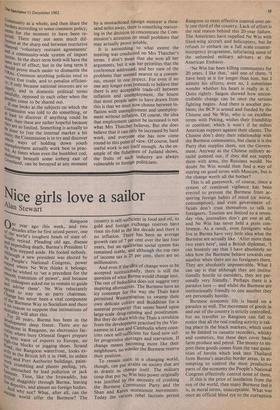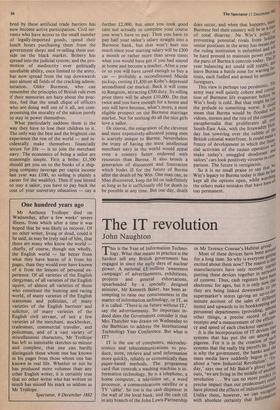Nice girls love a sailor
an Stewart
ORangoon ne Year ago this week, and two Of decades after he first seized power, one rk,.the World's toughest heads of state of- aLla!IY retired. Pleading old age, disease Ne Pending death, Burma's President U Aiihwin stepped aside. He fooled nobody. the"1°,1181) a new president was elected by st;‘, reople's National Congress, power siZed where Ne Win thinks it belongs; 5:ee he wished to 'set a precedent for the tooth transition of power', and because artiv „'" colleagues asked me to remain to guide " advise them'. Ne Win reluctantly eirieed to stay on as party chairman. of Inge has never been a vital component is `'`e Burmese Way to Socialism and there 410° reason to suppose that intimations of oprtalitY will alter this. dev 20 years, Burma has been in the sh'eloPment deep freeze. There are no rore.r4tons in Rangoon, no electronics fac- ihe'les where busy Oriental fingers prepare hiphile.xt wave of exports to Europe, no 1107e blocks or jogging shoes. Strand a„ go, the Rangoon waterfront, looks ex- 11%-otly„ as the British left it in 1948, its sedate wo`el and Port Authority buildings, paint- butrk crumbling and plaster peeling, yes, ha' untouched by lead pollution or jack drinIc,il jTime, like the Irrawaddy, has `ed sluggishly through Burma, leaving An dePosits, and almost no foreign bodies. d Why not? What, after all, can the tsicie
world offer the Burmese? The country is self-sufficient in food and oil, its gold and foreign exchange reserves have risen six-fold in the last decade and there is no inflation. There has been an average growth rate of 7 per cent over the last four years, but an egalitarian social system has remained stable, and although the top rate of income tax is 25 per cent, there are no millionaires. And even if the idea of change were to be Y, there is still the accepted institutional! question of what Burma would change into. The rest of Indochina does not suggest very inspiring alternatives. The Burmese have an icy contempt for the way the Thais have permitted Westernisation to swamp their own delicate culture and Buddhism for a material prosperity that seems based upon large-scale drug-running and prostitution. But they do share with the Thais a revulsion from the develop rnent practised by the Viet- namese in Laos and Cambodia where coun- tries once self-sufficient for food now suf- fer progressive shortages and starvation. If change means becoming more like their neighbours, no wonder the Burmese reserve their position. To remain static in a changing world, though, can put strains on society that are as drastic as change itself. The military coup that put Ne Win into power originally was justified by the necessity of crushing the Burmese Communist Party and the Shan and Karen secessionist movements. Today the various rebel factions permit Rangoon to exert effective control over on- ly one third of the country. Lack of effort is the real reason behind this 20-year failure. The Americans have supplied Ne Win with fixed-wing aircraft and helicopters, but he refuses to embark on a full scale counter- insurgency programme, infuriating some of the unheeded military advisers at the American Embassy.
`Ne Win has been killing communists for 20 years. I like that,' said one of them. 'I have been at it for longer than him, but I admire his efforts; even so, I sometimes wonder whether his heart is really in it.' Quite rightly. Saigon showed how uncon- trollable change can be once the serious fighting begins. And there is another pro- blem; the BCP is armed and funded by the Chinese and Ne Win, who is on excellent terms with Peking, wishes their friendship to continue; which it won't if he enlists American support against their clients. The Chinese don't deny their relationship with the Burmese communists, but claim it is the Party that supplies them, not the Govern- ment. Anyway as the Chinese military at- taché pointed out, if they did not supply them with arms, the Russians would. No doubt Ne Win would then find a way of staying on good terms with Moscow, but is the change worth all the bother?
This is all guesswork, of course, since a system of continual vigilance has been erected to prevent the Burmese from ac- quiring foreign habits of mind (or worse, consumption), and even government of- ficials don't trust themselves to talk to foreigners. Tourists are limited to a seven- day visa, journalists don't get one at all, and Ne Win has never held a press con- ference. As a result, even foreigners who live in Burma have very little idea what the Burmese are actually like. 'After more than two years here', said a British diplomat, 'I can honestly say that I have absolutely no idea how the Burmese behave towards one another when there are no foreigners there. They are absolutely impenetrable. What I can say is that although they are institu- tionally hostile to outsiders, they are per- sonally very friendly.' Perhaps there is a paradox here — and whilst the Burmese are institutionally friendly to one another they are personally hostile.
Burmese economic life is based on a paradox as well. The movement of goods in and out of the country is strictly controlled, but no traveller to Rangoon can fail to notice that all the real trading activity is tak- ing place in the black markets, which used to be limited to cassette recorders, whisky and cosmetics, but these days cover basic farm produce and petrol. The money to im- port these goods comes from the vast quan- tities of heroin which leak into Thailand from Burma's anarchic border areas. In at- tempting to control the most productive parts of the economy the People's National Congress effectively control none of them.
If this is the price of insulation from the rest of the world, then many Burmese feel it is, in moral terms, unacceptable. What was once an official blind eye to the corruption bred by these artificial trade barriers has now become active participation. Civil ser- vants who have access to the small number of legally-imported goods, spend their lunch hours purchasing them from the government shops and re-selling them out- side on the black market. Bribery has spread into the judicial system; and the pro- motion of mediocrity over politically unreliable ability, once limited to the army, has now spread from the top downwards into almost all fields of the cracking admin- istration. Older Burmese, who can remember the principles of British rule even if their memories are hazy about the prac- tice, feel that the small clique of officers who are doing well out of it all, are com- promising the morality of the nation purely to stay in power themselves.
What particularly saddens them is the way they have to lose their children to it. The only way the best and the brightest can experience the rest of the world — and in- cidentally make themselves financially secure for life — is to join the merchant navy. The economics of being a sailor are stunningly simple. First a bribe: £1,500 should get you on to the books of a ship- ping company (average per capita income last year was £100, so sailing is plainly a career for the wealthy). Then if you intend to stay a sailor, you have to pay back the cost of your university education — say a
further £2,000, but since you took good care not actually to complete your course you won't have to pay. Then you have to pay half your sailor's salary straight into a Burmese bank, but that won't hurt too much since your starting salary will be £300 a month or rather more than seven times what you would have got if you had stayed at home and become a teacher. After a year or so you will have saved enough to buy a car — probably a reconditioned Mazda pickup, costing £1,850 on Kobe's depressed secondhand car market. Back it will come to Rangoon, attracting £500 duty. Its selling price there will be about £10,000. Do that twice and you have enough for a house and you will have become, what's more, a most eligible prospect on the Burmese marriage market. Not for nothing do all the nice girls love a sailor.
Or course, the emigration of the cleverest and most expensively-educated young men is scarcely unique to Burma. Nevertheless the irony of having the most intellectual merchant navy in the world would appal even a country letter endowed with resources than Burma. It also breeds a generation of discontent and frustration which bodes ill for the future of Burma after the death of Ne Win. One man can, as Mao discovered, keep the lid on indefinitely as long as he is sufficiently old for death to be possible at any time. But one day, death
does occur, and when that happens, mal17, Burmese feel their country will be in a sta`i of total disarray. Ne Win's policY ° preventing potential rivals from holding senior positions in the army has meant thal'i the ruling institution is enfeebled and sv:n be hard pressed to maintain power even ;0 the parts of Burma it controls today. 1-11!r;ci year balancing act could still topple, 7, leave Burma a battle zone for warring ; tions, each fuelled and armed by ambit° foreigners. This view is perhaps too pessimistic. Tne army may well quietly cohere and coil tion of Burmese life evaporate before .1 Win's body is cold. But that might be Ini'd the prelude to something worse. It °lab mean that Burma would be flooded vidoes, stereos and the rest of the consunteer paraphernalia that proliferates all South-East Asia, with the IrrawaddY day Inn towering over the rubble of n'a British colonial waterfront. It could ateallw frenzy of development in which the filial! cial activities of the casino operators 0_16 make today's smuggled deodorant an_ sailors' cars look positively virtuous in con'
parison. The future is vertiginous.
t Se So it is no small praise to saY t"a' „as Win's legacy to Burma today is that he kept all the options open, while watchl the others make mistakes that have been nj too permanent.











































 Previous page
Previous page